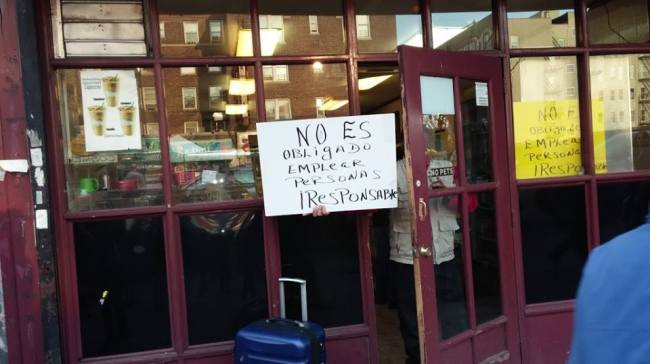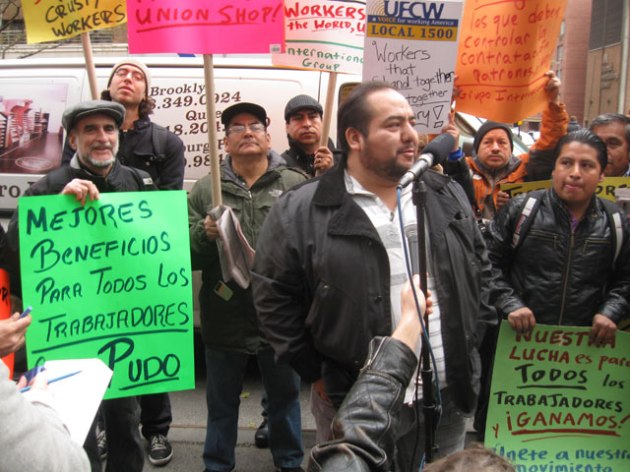Dominican Bosses vs. Dominican Workers in Washington Hts.
 ¿Es obligado pagar el sueldo mínimo?
¿Es obligado pagar el sueldo mínimo?
I don’t know much about the one day strike by fast food workers last December 5th, except for what a friend told me had happened to him and his coworkers. Since they haven’t resolved that situation, I can’t give details, but I can say that they participated in the strike, the idiot of a boss tried to fire the people he thought had organized it, they went to the DA’s office, and everyone got their jobs back. After that the owner refused to recognize the union, but he did give a raise to about half his employees. The workers talked about an action, but the majority, either satisfied with the raises they had gotten or afraid to lose their jobs, voted against it. As far as I know, that’s where it ended.
I mention all this because last Monday, Nosotr@s los Pobres attended a picket in front of Kenny Bakery on Dyckman Street, in support of the Laundry Workers’ Center and Moraima Ortiz, a Center member. You can imagine how strange it seemed for us, after doing so much work against gentrification, to be picketing a Dominican business in Washington Heights—especially a business that caters to working people. Across Broadway on Dyckman Street you can get tapas, a latte, some dressed up platanos that cost $15, but incredibly you can’t get a quipe or a pastelito or an empanada de yuca anywhere. We don’t have any doubt the gentrifier businesses over there engage in all kinds of exploitation and abuse, so we had to think about it before picketing a place as completely Dominican as Kenny Bakery—especially since some of us had been their customers for years!
But as Dominican as they might be, Kenny Bakery’s coffee is a pretty bitter drink. The worker we mentioned, Moraima Ortiz, worked eight years there without ever being paid the minimum wage—in fact, from 2004 to 2011, she worked 57 hours a week and got paid $250 weekly for it. Don’t even start to talk about overtime. She was verbally and even physically harassed, and was fired without notice, and the owner still hasn’t paid her the back wages that she owes her.
It’s a good example of what we said in our last blog (“Mierda! Me salió Balaguer!”). A boss is a boss—in this case her name is Iris Minaya—regardless of where they’re from. Just like Dominican bosses exploit Haitian workers in DR, they’ll exploit you even if you’re as Dominican as they are; just like Latino bosses in New York exploit African workers, they exploit Mexican and Dominican workers. Equal opportunity. As a matter of fact, the majority of the people who came out to support Moraima Ortiz, Dominican, were the Mexican workers of the independent Hot and Crusty union.
It’s worth talking about that union, because they were the ones who told us about the picket in front of Kenny Bakery. It’s not a union of comfortable bureaucrats who come from their office and tell people to go out and get in trouble; the people who organized the picket line on Dyckman are the same people who work making bread and pizza at Hot and Crusty. They are almost all from Mexico, and they have their union thanks to a long struggle against some powerful and completely shameless bosses.
From what I know, the workers at Hot and Crusty asked the Laundry Workers’ Center for help in autumn of 2011. Two months later, they announced their demand to be recognized as a union, and they went to court over hours of unpaid wages. When they were able to certify the union, the owner settled the wage case, but when the union began to negotiate a contract he told them that he would close the shop within ten days. On August 31st there was an occupation of the store for several hours, and a picket line was started. They got the support of most of the other unions in New York, and they carried on a court case and a picket at the same time. The boss, with his business closed, lasted almost three months losing money, and finally, after 55 days of struggle, when some of them were almost ready to give in, the workers won their right to a union, the contract they wanted, the right to hire new personnel themselves, vacation and sick days, and a raise for everybody.
The more I think about the fast food strike, the more the example of Hot and Crusty comes to mind. These are people who didn’t have any more power than you—less, even, because there’s a big national organization behind your strike, and the Hot and Crusty struggle was carried out by a local workers center. The bosses of Hot and Crusty wanted, on the one hand, to intimidate the workers by saying they were going to close the business, and on the other hand buy them out, by offering raises to some of the organizers. Nevertheless they went on with their struggle, and their working conditions are better because of it, without question. Look at your own case. You’re afraid you might lose your jobs, but if you think about it, half of you got a raise after just a day of striking. Imagine what you would have gotten in 55 days. If you don’t want to push the demand for a union right now, you can form a committee of the most active of you. The committee can go together to complain when any worker has a problem at work—if you go together, the law protects you from retaliation. If one of you goes alone to make a complaint, they can fire you if they want. Above all, I invite you to participate in the pickets in support of Moraima Ortiz, so you can talk with fellow workers who won their struggle for a union, and so you can see that you have support in the community.
You have to remember one more thing. These people always have money to pay us more than what they give us. Look where Hot and Crusty is, on 63rd and 2nd; the sales have to be a thousand times what they pay the workers. Kenny too; this lady is losing a lot of money while the picket line cuts into her sales. Just think—if they really can’t afford it, why did half of you get a raise after just one day in the street? Why, when the union was going to be so expensive that Hot and Crusty would have to close, were they able in the end to not only recognize the union but give them benefits that almost no one else has? And business is better than ever.
There are people who talk about things like “class struggle”, until you get tired of hearing them, but the truth is it makes sense. Look at Kenny Bakery. Iris Minaya, the boss who doesn’t pay her debts, the one who owes so much money to Moraima Ortiz, looks like a regular person, a Dominican woman who came here with the idea of getting ahead, and she did it. The problem isn’t that Iris Minaya is a monster; the problem is that now she’s part of another social class, she’s the boss. Now her interests, and ours, the people who do the work, are in conflict. Now a dollar that she takes out of our wages is a dollar for her grandkids’ education, because now she lives off of our work. Sure, you don’t have to be a bad boss. With a place like Kenny, she could pay herself a good salary and take care of all of her workers. Just like I could take a thousand dollars out of the bank and give it to a stranger in the street; I could, but who does? The system doesn’t reward a boss who gives an equal share to her employees, the system rewards a boss who gets everything they can out of their employees and then throws them out when they aren’t any use to her any more. We can draw two conclusions from all of this: first, that “class struggle” isn’t a myth, because it’s in one class’s interest to lower the other class’s salary; and second, that it’s not the people that we have to change, it’s the system that rewards greed.


